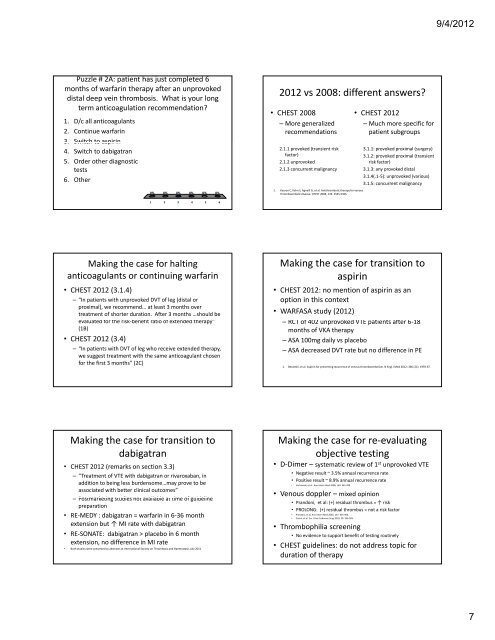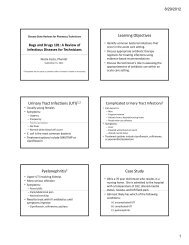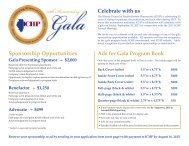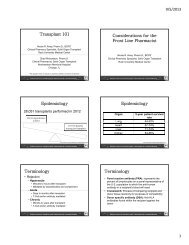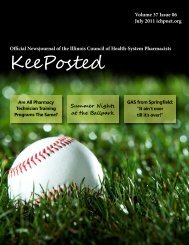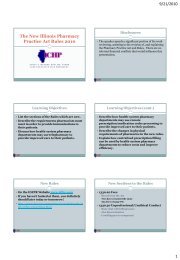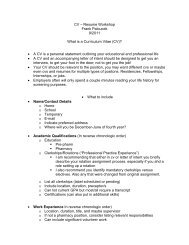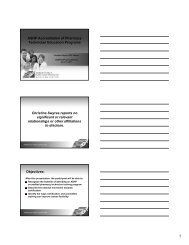Presentation Outline ICHP Annual Meeting September 13-15
Presentation Outline ICHP Annual Meeting September 13-15
Presentation Outline ICHP Annual Meeting September 13-15
Create successful ePaper yourself
Turn your PDF publications into a flip-book with our unique Google optimized e-Paper software.
Puzzle # 2A: patient has just completed 6<br />
months of warfarin therapy after an unprovoked<br />
distal deep vein thrombosis. What is your long<br />
term anticoagulation recommendation?<br />
1. D/c all anticoagulants<br />
2. Continue warfarin<br />
3. Switch to aspirin<br />
4. Switch to dabigatran<br />
5. Order other diagnostic<br />
tests<br />
6. Other<br />
0% 0% 0% 0% 0% 0%<br />
1 2 3 4 5 6<br />
Making the case for halting<br />
anticoagulants or continuing warfarin<br />
• CHEST 2012 (3.1.4)<br />
– “In patients with unprovoked DVT of leg (distal or<br />
proximal), we recommend… at least 3 months over<br />
treatment of shorter duration. After 3 months …should be<br />
evaluated l t df for th the risk‐benefit ikb fitratio ti of f extended t d dth therapy” ”<br />
(1B)<br />
• CHEST 2012 (3.4)<br />
– “In patients with DVT of leg who receive extended therapy,<br />
we suggest treatment with the same anticoagulant chosen<br />
for the first 3 months” (2C)<br />
Making the case for transition to<br />
dabigatran<br />
• CHEST 2012 (remarks on section 3.3)<br />
– “Treatment of VTE with dabigatran or rivaroxaban, in<br />
addition to being less burdensome…may prove to be<br />
associated with better clinical outcomes”<br />
– PPostmarketing t k ti studies t di not t available il bl at t time ti of f guideline id li<br />
preparation<br />
• RE‐MEDY : dabigatran = warfarin in 6‐36 month<br />
extension but ↑ MI rate with dabigatran<br />
• RE‐SONATE: dabigatran > placebo in 6 month<br />
extension, no difference in MI rate<br />
• Both studies were presented as abstracts at International Society on Thrombosis and Haemostasis July 2011<br />
2012 vs 2008: different answers?<br />
• CHEST 2008<br />
– More generalized<br />
recommendations<br />
2.1.1 provoked (transient risk<br />
factor)<br />
2.1.2 unprovoked<br />
2.1.3 concurrent malignancy<br />
1. Kearon C, Kahn S, Agnelli G, et al. Antithrombotic therapy for venous<br />
thromboembolic disease. CHEST 2008; <strong>13</strong>3: 454S‐545S.<br />
• CHEST 2012<br />
– Much more specific for<br />
patient subgroups<br />
3.1.1: provoked proximal (surgery)<br />
3.1.2: provoked proximal (transient<br />
risk factor)<br />
3.1.3: any provoked distal<br />
3.1.4(.1‐5): unprovoked (various)<br />
3.1.5: concurrent malignancy<br />
Making the case for transition to<br />
aspirin<br />
• CHEST 2012: no mention of aspirin as an<br />
option in this context<br />
• WARFASA study (2012)<br />
– RCT of f 402 unprovoked kdVTE VTE patients ti t after ft 6‐18 6 18<br />
months of VKA therapy<br />
– ASA 100mg daily vs placebo<br />
– ASA decreased DVT rate but no difference in PE<br />
1. Becattini, et al. Aspirin for preventing recurrence of venous thromboembolism. N Engl J Med 2012; 366 (21): 1959‐67.<br />
Making the case for re‐evaluating<br />
objective testing<br />
• D‐Dimer – systematic review of 1 st unprovoked VTE<br />
• Negative result ~ 3.5% annual recurrence rate<br />
• Positive result ~ 8.9% annual recurrence rate<br />
• Verhovsek, et al. Ann Intern Med 2008; 149: 481‐490.<br />
• Venous doppler – mixed opinion<br />
pp p<br />
• Prandoni, et al: (+) residual thrombus = ↑ risk<br />
• PROLONG: (+) residual thrombus = not a risk factor<br />
• Prandoni, et al. Ann Intern Med 2002; <strong>13</strong>7: 955‐960.<br />
• Cosmi, et al. Eur J Vasc Endovasc Surg 2010; 39: 356‐365.<br />
• Thrombophilia screening<br />
• No evidence to support benefit of testing routinely<br />
• CHEST guidelines: do not address topic for<br />
duration of therapy<br />
9/4/2012<br />
7


